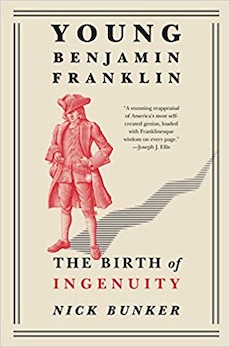By Louis J. Kern
Walter Isaacson observed that Franklin “cared more about public behavior than inner piety, and he was more interested in building the City of Man than the City of God” (Benjamin Franklin: An American Life, 2004). Bunker’s penetrating narration of Franklin’s early life concurs, following the course of his religious development from orthodox Calvinism to atheism (Dissertation on Liberty and Necessity, Pleasure and Pain, 1725) to a poetic and practical faith (Articles of Belief and Religion, 1728). Yet, Franklin was above all a shrewd man of business and public affairs: he championed the fervently evangelical George Whitefield (1739-41) and published his journals, a contract that proved eminently profitable. In 1787 he proposed adoption of an opening prayer at the Continental Congress, because he saw others valued orthodox Christianity and it had utility in cementing adherence to a new social and political order. Franklin’s theism has been tendentiously misconstrued by modern evangelicals’ assertion that the U.S. is a Christian country whose Founding Fathers built biblical orthodoxy into the Constitution and were themselves true believers (See Kevin M. Kruse, One Nation Under God: How Corporate America Invented Christian America, 2015).
Bunker’s original reading challenges the mythic Franklin—the quintessential self-made man—by focusing attention on his genealogy and literary and philosophical influences. Viewing Franklin as primarily characterized by ingenuity—the ability to combine the work of the hands and the mind, curiosity, common sense, and inventiveness—Bunker demonstrates that his forebears exhibited those qualities through three generations. Intellectual influences included Addison and Steele’s Spectator Papers, Alexander Pope, John Milton, John Locke, and Isaac Newton.
Bunker’s narrative climaxes in Franklin’s scientific study of electricity that earned him membership in the Royal Society. Politically, the early Franklin remained a colonial Whig, who sought to secure traditional English liberties for Pennsylvania as set forth in his vade mecum, English Liberties (Henry Care, 1682). Though Franklin’s mistakes are duly noted, Bunker downplays his troubled relations with his wife, Deborah and his illegitimate son, William, and his extended torturous relationship with his birth family.
Bunker’s Franklin has the flaws of callow youth, but he learns from his mistakes and grows into a solid, public-minded burgher—from impoverished printer’s apprentice to respected gentleman. Some areas of growth, however, were less productive. Franklin owned slaves and ran reward notices for runaways in the Pennsylvania Gazette. Only in the 1750s did he express doubts about slavery and as late as 1790 he questioned the economic practicality of emancipation; how were owners to be remunerated? (See “Sidi Mehemet Ibrahim on the Slave Trade,” Federal Gazette, March 2, 1790).
Bunker’s Franklin remains “the [Robinson] Crusoe of the colonies, with an inner core of confident resilience,” who reaffirms his identity as the quintessential representative American, a figure of optimism and self-improvement. What is missing here is the sly ingeniousness, the cunning equivocation, and the charming ribaldry of the man. Bunker mentions “Old Mistress Apologue” (1745), branding it “misogynistic,” but ignores the opera bouffe “Casuist”-“Anti-Casuist” mock Platonic dialogue on practical justice for adultery (1732), “The Usefulness of an Old Half of a Pair of Scissors” (1768), and the scatological “Fart Proudly” (1753?). The “Casuist” and “Fart” circulated privately, only published a century later, and are still omitted in the two-volume Library of America edition of his writings.
Bunker provides a unique perspective on the youthful Franklin and his influences but misses the core of the man. As Franklin wrote in his Autobiography, “so convenient a thing is it to be a reasonable Creature since it enables one to find or make Reasons for everything one has a mind to do.”
Louis J. Kern (ΦBK, Clark University) is professor emeritus of history at Hofstra University. Hofstra University is home to the Omega of New York chapter of Phi Beta Kappa.




